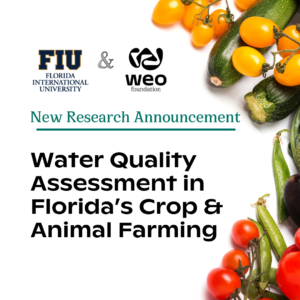In collaboration with Florida International University’s Institute of Environment, Weo Foundation will be assessing the quality of water used in Field crops, and in Animal farms. This study, conducted by researchers in the Conservation & Sustainable Horticulture Lab of Agroecology Program, Department of Earth and Environment, will provide an overview on the quality of water used in the Agriculture sector for diverse major commodities throughout the state of Florida.
 Water and its quality is critical to the life and economy of Florida as it is vital for plants, animals, and humans. The majority of the state’s water comes from aquifer systems under. There are two major aquifers in Florida: the Floridan (the whole state), and the Biscayne (South Florida). The Floridan aquifer is the largest and deepest in the state. It holds groundwater like a sponge. Its holes allow the water to move freely through it. The Floridan aquifer stretches for 82,000 square miles beneath Florida and parts of Alabama, Georgia, and South Carolina.
Water and its quality is critical to the life and economy of Florida as it is vital for plants, animals, and humans. The majority of the state’s water comes from aquifer systems under. There are two major aquifers in Florida: the Floridan (the whole state), and the Biscayne (South Florida). The Floridan aquifer is the largest and deepest in the state. It holds groundwater like a sponge. Its holes allow the water to move freely through it. The Floridan aquifer stretches for 82,000 square miles beneath Florida and parts of Alabama, Georgia, and South Carolina.
Irrigation water quality is a critical aspect of crop production. There are many factors which determine water quality. Among the most important are alkalinity, pH and soluble salts. But there are several other factors to consider, such as whether hard water salts such as calcium and magnesium or heavy metals that can clog irrigation systems or individual toxic ions are present.
Poor quality water can be responsible for slow growth, poor aesthetic quality of the crop and, in some cases, can result in the gradual death of the plants. High soluble salts can directly injure roots, interfering with water and nutrient uptake. Water with high alkalinity can adversely affect the pH of the growing medium, interfering with nutrient uptake and causing nutrient deficiencies which compromise plant health. Water is also a critical nutrient for livestock and poultry. As with feed ingredients, livestock water should always meet the nutritional needs of the animal. An adequate and safe water supply is essential to the growth, reproduction, or productivity of healthy livestock and poultry.
A Standard Operating Procedure for Water Sampling from Wells will be established to assess water quality by evaluating different quality parameters including physical parameters, metals, inorganic nonmetallic constituents, volatile organic compounds, pesticides, and biological organisms. The study will assess the well water quality of 30 different agricultural farms distributed throughout Florida. The crop farms will cover seven commodities including vegetables, citrus, strawberries, peanuts, tomatoes, subtropical fruit trees, and ornamentals. Likewise, five different livestock commodities including beef cattle, dairy cattle, swine, equine, and poultry will represent the livestock sector. Each commodity will be evaluated at least three times i.e., at least three farms having the same commodity will be selected for better assessment of water quality in such farms.
Weo Foundation and FIU will share the results in September 2022.
////////////////////////////////////////////
More info about our partner:
Conservation & Sustainable Horticulture Lab of Agroecology Program
Department of Earth and Environment
